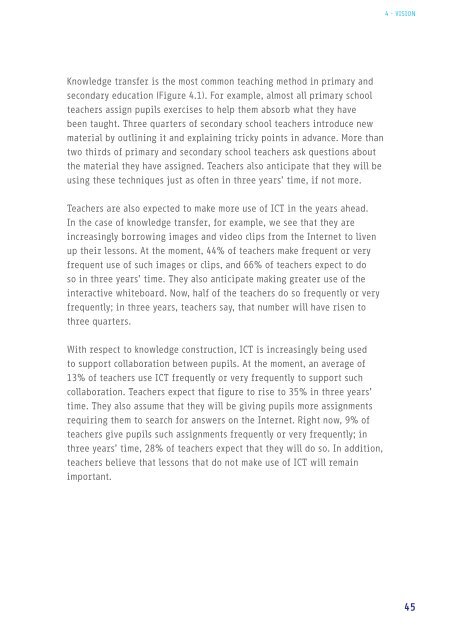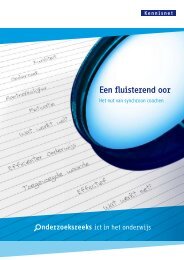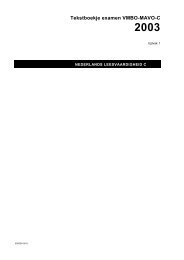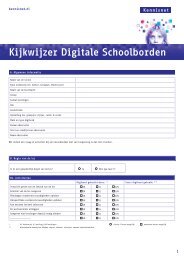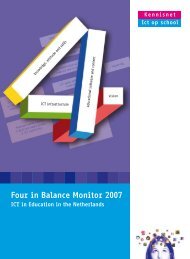Four in Balance Monitor 2011 - downloads.kennisn... - Kennisnet
Four in Balance Monitor 2011 - downloads.kennisn... - Kennisnet
Four in Balance Monitor 2011 - downloads.kennisn... - Kennisnet
You also want an ePaper? Increase the reach of your titles
YUMPU automatically turns print PDFs into web optimized ePapers that Google loves.
Knowledge transfer is the most common teach<strong>in</strong>g method <strong>in</strong> primary and<br />
secondary education (Figure 4.1). For example, almost all primary school<br />
teachers assign pupils exercises to help them absorb what they have<br />
been taught. Three quarters of secondary school teachers <strong>in</strong>troduce new<br />
material by outl<strong>in</strong><strong>in</strong>g it and expla<strong>in</strong><strong>in</strong>g tricky po<strong>in</strong>ts <strong>in</strong> advance. More than<br />
two thirds of primary and secondary school teachers ask questions about<br />
the material they have assigned. Teachers also anticipate that they will be<br />
us<strong>in</strong>g these techniques just as often <strong>in</strong> three years’ time, if not more.<br />
Teachers are also expected to make more use of ICT <strong>in</strong> the years ahead.<br />
In the case of knowledge transfer, for example, we see that they are<br />
<strong>in</strong>creas<strong>in</strong>gly borrow<strong>in</strong>g images and video clips from the Internet to liven<br />
up their lessons. At the moment, 44% of teachers make frequent or very<br />
frequent use of such images or clips, and 66% of teachers expect to do<br />
so <strong>in</strong> three years’ time. They also anticipate mak<strong>in</strong>g greater use of the<br />
<strong>in</strong>teractive whiteboard. Now, half of the teachers do so frequently or very<br />
frequently; <strong>in</strong> three years, teachers say, that number will have risen to<br />
three quarters.<br />
With respect to knowledge construction, ICT is <strong>in</strong>creas<strong>in</strong>gly be<strong>in</strong>g used<br />
to support collaboration between pupils. At the moment, an average of<br />
13% of teachers use ICT frequently or very frequently to support such<br />
collaboration. Teachers expect that figure to rise to 35% <strong>in</strong> three years’<br />
time. They also assume that they will be giv<strong>in</strong>g pupils more assignments<br />
requir<strong>in</strong>g them to search for answers on the Internet. right now, 9% of<br />
teachers give pupils such assignments frequently or very frequently; <strong>in</strong><br />
three years’ time, 28% of teachers expect that they will do so. In addition,<br />
teachers believe that lessons that do not make use of ICT will rema<strong>in</strong><br />
important.<br />
4 - VISIoN<br />
45


